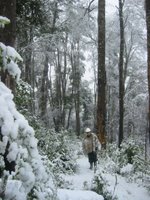 “This one had his two feet in the grave!” Doña Licha’s great doughy hand flopped at her octogenarian husband. A month ago in this bad Patagonian winter he’d fallen on a rock going out for firewood. Six days later was helicoptered into the city hospital with broken ribs.
“This one had his two feet in the grave!” Doña Licha’s great doughy hand flopped at her octogenarian husband. A month ago in this bad Patagonian winter he’d fallen on a rock going out for firewood. Six days later was helicoptered into the city hospital with broken ribs.Leonidas Pinto, the exhibit under discussion, squinted at me and nodded. It was true. He liked to cross his arms over his chest, but today his hands were folded in his lap. Six days?
“Without a word. And almost a week it took him to admit it.” Doña Licha’s baritone voice resonated in their bare kitchen, decorated with grandkids’ soccer trophies and various rodents and raptors which had undergone amateur taxidermy. Cozy it wasn’t, at the end of the valley, in a worn farmhouse under the glaciers.
To boot the goats were dying—they’d managed to sell off the calves but their remaining animals had neither shelter nor sufficient grazing. Buying supplementary feed was a great cost for these poor subsistence farmers, one that they might not need to incur if the winter came rainy and gentle. This one didn’t.
Chile is having a killer winter. Rain or snow filled the entire month of May. On May 20 over forty soldiers marched to their death on the flanks of Antuco volcano because their commander ordered to change posts despite blizzard warnings. The government (it is an election year) is sending aid to its isolated residents, like the Pintos, which included feed for the animals and some for the people too. A couple of bales of hay dropped by helicopter might not make much of a difference if it keeps snowing. I love the snow; prefer it a hundredfold to the constant southern rains, but ranchers feel differently. Snow is death.
One rancher had lost up nineteen sheep to lingue, a plant poisonous to animals, but attractive when there’s little else to forage. Trips to get medicine were out of the question and things like meat, dairy, fruit and vegetables were scarce. People ate dried meat, fry bread, potatoes. The Pintos had recently sacrificed a horse with a broken leg and the maroon strips were salted and strung up like Christmas decorations throughout the house. The animal had belonged to their oldest grandson, Johnson. He moped and stayed away.
In these conditions I went out to make my last visit to the people of Ventisquero Valley, seeing what wasn’t there in summer. Couples who had been holed up alone for a month snapped and crackled when butter was requested. Hairbrushes were forgotten. Knitting needles clicked. Dogs were real thin. Midday folks looked out their small windows guessing which dim mountain their animals had retreated to.
I admit I went because I had heard about Don Leonidas’s accident. I was afraid he might be dying. There were signs—his grown daughter grabbed a photo I’d offered her father of the two of them, “as a remembrance.” Doña Licha said that she wouldn’t step foot in a hospital again, that you went there to die, and even that you couldn’t do so well in those places. Don Leonidas took advantage of his new frailty to tell me he remembered nothing anymore, so went my questions of the old days.
Instead of prying I ate some fry bread with instant coffee and had a real visit. Doña Licha got stirred up and said she’d cook a goose if I came the next day. Would I? Everything depended on the reprieve of bad weather, and I was sure it wouldn’t happen. “Don’t you get it?” Don Leonidas said from his shaded corner, long unnoticed by all. “The girl’s trying to say goodbye.”
“The fox” they called him. I was convinced then that his wits were still sharp, but it was his game now, and he’d play it how he wanted to. But I was gaining on him too. If I asked he would send a grandson to show me the hidden trails to the pass. Maybe he would tell me about the old persecutions of the law, his wanderings to Argentina, his happenstance survival and the revolutions his mind took as he sat here in the half-darkness, with a whole hard life behind him.
I left before the darkness would catch up, promising to be back in spring.
No comments:
Post a Comment